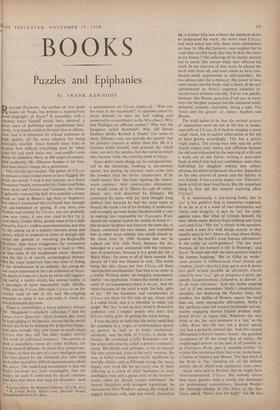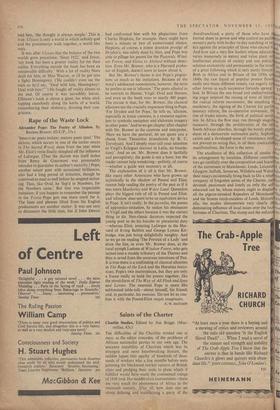BOOKS
Puzzles and Epiphanies
By FRANK KER MODE
ELLMANN, the author of two good books on Yeats, has written a superlatively ood biography of Joyce.* It assembles, with a astery Joyce himself would have admired, a reat mass of published and unpublished testi- oily; it proceeds without the least fuss or alfecta- ton; and it is informed by critical comment of Igh quality, all the more effective for being paringly inserted. Joyce himself once tried to Xplain how difficult everything must be 'when Your life and work make one,' and couldn't even nish his sentence. Here; in 800 pages of remark- able authority, Mr. Ellmann finishes it for him, and fixes Joyce's image for a generation.
This service was needed. The-power of Ulysses 0 possess a man's mind seems to have flagged; the ook has dated. I read it last summer on a fairly ausicaan beach, surrounded by Cissies and Edies , new style) and Jackies and Tommies, for whom gallantly returned the ball. It is certainly a better ook to read at Bloom's age than at Stephen's; ut when I mentioned this to friends they thought me old-fashioned or posing. lf, you were ever - flushed and excited by Ulysses you are probably now over forty; if you ever tried to live by it, Over thirty. Under thirty, people seem to be a little bored by Joyce's endless experimentation, and also by the setting up of a polarity between prose and Poetry which is rendered in terms of straight talk about the genitals or swooning pre-Raphaelite
rhythms. Also Joyce exaggerates the remoteness ai • ,. of his social context by pushing it back to 1904,
ri so that some of the naughtiness about 'drawers' and the like is of merely archaeological interest. Rut far more important than this kind of fading is the obsolescence of an aesthetic; the young .are not much interested in the vast ambition of Joyce, , his desire to make of a book an entire-self-support- log world, a reality which,, like normal reality,. is a paradigm of some inaccessible truth. Dublin, 190-1, was his Vision. One-reads Ulysses as on the cosmic scale Or not at all; and life-crippling attempts to make it new and make it whole are not fashionable just now.
There is, nevertheless,. a Joyce industry; witness
Magalaner's scholarly collection:t and the Vanies Joyce Quarterly. Joyce foresaw this when he kept adding to his puzzles, saying that he would ;insure his fame by keeping the professors happy; sand, sure enough, they now know so much about jL1lysses- that they call 'the older studies' merely 'the work of cultivated amateurs.' The articles in )uch • a miscellany, same dry some brilliant, are ;not in need of defence: At worst they contain use- iful hints; or they are part of a very intelligent game 'like that played by the Austenite (%/ite who send each other incredibly difficult questionnaires about the wurre. The underlying assumption is that the books involved are fully meaningfill, that the reality of each is confirmed by occult relations and laws that often wait long for discovery. Such * JAMES JOYCE: By Richard Ellmann. (0.U.P., 63s.) t A JAMES JOYCE MISCELLANY (Second Series). (Southern Illinois U.P., 40s.) a questionnaire on Ulysses might ask : 'Who was the man in the macintosh?' (a question asked by Joyce himself, to start the ball rolling, and answered by a contributor to the Miscellany). Why had Mulligan an afflicted mother? Why was the hangman called Rumbold? Why did Simon Dedalus dislike Reuben J. Dodd? For some of these, Ellmann only can provide the answer; but his primary concern is nobler than this. He is a Joycean holist himself, and presents the whole man; not only the puzzles, but the world in which they became valid, the creating mind of Joyce.
Joyce didn't make things up; he compared him- self to the demiurge, working in pre-existent matter, but getting, he claimed, more order into the product than his divine counterpart. If he could ensure that 'the traits figuring the chiaro- scuro coalesce, their contrarieties eliminated,' joy would come of it Hence his cult of coinci- dence, very well described by Ellmann. He associated his name with joy (and thought Jung disliked him because he had the same name as Freud). He made a lot Of his birthday (Candlemas) and strangely pursued Jarnes Stephens with a view to making him responsible for Finnegans Wake should the original author be unable to finish. it— this because Stephens was born on the same day as Joyce, combined his two names, and resembled him in other ways nobody else would attend to. He chose June 16, 1904, because that day he walked out first with Nora, because the day belonged to a saint associated with the reclama- tion of prostitutes, because it is a good day for a Black Mass: for some or all of these reasons. His picture of Cork was framed in cork. The world being like this, Joyce put into Ulysses all those `unexpected simultaneities' that hint at an order in a world. Without .order, no integrity, consonance, clarity--no epiphanies. Unless the world is a net- work of correspondences there is no joy. And the entire business of the artist is With 'the holy spirit of joy.' All the banalities and complexities of Ulysses are there for the sake of joy; Joyce calls it a comic book, says it is intended `to make you laugh.' But 'joy' is not an easy word in Romantic iesthetics: and I suspect people who don't find Ulysses fairly grim of getting the word wrong.
. From the start he held that the artist could find . his epiphany in a vulgar or commonplace speech
• or gesture as well as in more 'eucharistic' moments; and the bulk of Ulysses is about the former. He combined a fully Romantic view of the artist with what he called 'a grocer's assistant's mind.' His beliefs and attitudes, so far as normal life was concerned, froze in his early twenties. He was, as Gillet found, almost totally indifferent to worldly affairs, and as Ellmann brings the Joyce family into vivid life We see every- one of them suffering as a result of what Stanislaus (a most intelligent man and a good critic of his brother's .work) called his 'proud, vicious selfishness.' He treated StanisUus with arrogant ingratitude; he squandered Miss Wea4er's money. He shared his ragged fortunes with, and was wholly dependent on, a woman who was without the means or desire to understand his work; she never read Ulysses, and once asked him why there were celebrations on June 16. (He did, however, once implore her to 'read that terrible book that has broken the heart in my breast.') The sufferings of his family seemed not to touch him except when they affected his work. In the interests of that work, he played the devil with them all, and even seems to have con- ducted small experiments in self-cuckoldry. He was always alert for a betrayer. His power to love went mostly into his book; only a shock of the sort administered by Nora's supposed infidelity re- leased much emotion into life. Yet he was pacific, humane; like Bloom, glum:Wig if not gut, in many ways the burgher marmite not the alienated artist; domestic, amiable, charitable, liking a joke. The Artist and the grocer; or, better, Stephen and Bloom.
The truth seems to be that the normal process of maturation went on not in life but in books, especially in Ulysses. It is hard to imagine a more 'adult' book, but its author often seems in life not to have grown accordingly. This has a purely tragic aspect. The young man who said the artist should expect only misery and affliction became the old man exhausted by the weaving of a life and a work out of one fabric, writing a post-adult book in which few had any confidence, more than half-blind, his daughter sinking into schizo- phrenia, his affairs in fantastic disorder, dependent on his own reserve of power and the fidelity of new friends. It has a comic aspect, too : Ellmann's book is full of sheer lived farce. But the important thing is, how did this unusual maturing affect
Ulysses?
It is, notoriously, a yea-saying book; but its `yes' is less positive than is sometimes supposed. In so far as it is a work of real consonance and clarity and integrity, it says its 'yes' for order against mess. But what of Ulysses himself, the hero whose name derives from nothing and God, outis and Zeus? His `yes' is simply to the question, can such a man live with things exactly as they usually seem to be? Above all, what about Molly, speaker of the world's most famous affirmative? Is she _really an earth-goddess? `The last word (human, all too human) is left to Penelope,' said Joyce. `It must end with the most positive word in the human language.' But to Gillet he wrote : 'pour peindre le balbutiement d'une femme qui s'endort, j'avais cherche a finir par le mot le mains fort qu'il m'etait possible de decouvrir. ravais trouve le mot "yes," qui se prononce a peine, qui signifie l'acquiescement, l'abandon, la detente, la fin de toute resivtance.' And this feeble expiring . 'yes' is, if one remembers Molly's unsatisfactory sexuality, her deploring the Purefoy baby, her prudery, her dislike- of flowers, nearer the mark/ than any more spectacular affirmation. Molly is the 'perfectly sane full amoral fertilisable untrust- worthy engaging shrewd limited prudent indif- ferent Weib,' as Joyce said. Whatever she may think or do, her very existence is a 'yes,' as the Liffey flows into the sea; not a grand special :yes' but a perfectly normal one. And this normal affirmation is Joyce's mature 'lesson'; the qualified acceptance of all the banal flux of reality, the middle-aged answer to the best of all possible or, as Finnegans Wake puts it, pensible worlds. To receive this revelation there had to be, in the book, a fusion of Stephen and Bloom. The last word of • the Wake is 'the,' standing for all the definite articles out of which such epiphanies must come, Joyce once said to Beckett that he might have 'over-systematised' Ulysses. But nobody knows how many puzzles make a world, and demiurges are professional systematisers. Sending Budgen the fantastic scheme of The Oxen of the Sun, Joyce asked, 'How's that for high?' but he also
told him, `the thought is always simple.' This is true; Ulysses is only a world in which nobody-god and the protomartyr walk together, a world like ours.
It was after Ulysses that the balance of the two worlds grew precarious. 'Since 1922,' said Joyce, 'my book has been a greater reality for me than reality. Everything outside the book has been an insuperable difficulty.' With a lot of reality Nora dealt for him, or Miss Weaver, or (if he got into a tight) Hemingway. (Ile couldn't even see the man so he'd say, "Deal with him, Hemingway! Deal with him!" ') He fought off reality almost to the end. Of course it was incredibly heroic. Ellmann's book is about a giant, his white stick tapping ceaselessly along the kerbs of a world, remembering their obduracy, divining their con- gruence.











































 Previous page
Previous page